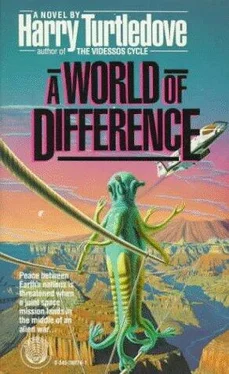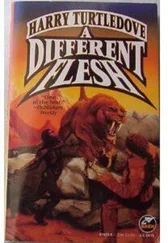The Minervan whose paddle Lopatin had taken let out a shrill scream of terror and leapt overboard. The rest of the locals, along with the KGB man, dug in even harder. Lopatin refused to look up; he would risk nothing that might distract him from his desperate rhythm.
Were they gaining? He almost tried not to believe it, for fear of slacking. But surely that mass of ice was not headed straight at the coracle anymore. Surely… The wave the ice mountain pushed ahead of itself lifted up the boat’s stern; Lopatin tried to tell himself he was imagining the wind of its passage.
Then it was past and some other boat’s problem. Heart pounding, Lopatin rested for a moment. A few more like that, he thought shakily, and the whole fleet would be someone else’s problem-probably the Virgin’s, in whose existence he did not believe. After angrily telling himself that, he wondered whether Minervans had souls.
“Is water like this all the time?” Fralk asked. If he did have a soul, he had been nearly frightened out of it; the blue of his skin was the next thing to purple.
“I hope not,” Lopatin answered, no sailor himself. In the aftermath of shared fright, he felt closer to the Minervan than he ever had, even during weapons training. Which reminded him: the only way Fralk would ever get his hands on the Kalashnikov was from Lopatin’s dead body.
That didn’t necessarily mean he would not get off a few shots of his own, though, when the time came.
The eastern wall of Jotun Canyon filled more and more of the sky ahead. Fralk saw it, too, and began to drift back toward his usual green. “We are doing it, Oleg Borisovich,” he said. Lopatin did not think he was reading surprise into the Minervan’s voice.
Nevertheless, he answered, “Da, Fralk, we are doing it.” That was no small feat, either, not when the Skarmer were inventing watergoing technology from scratch. He peered upstream, downstream. The water was still full of boats, in spite of the dreadful swath that enormous hunk of ice had cut through them. “So are most of the rest.”
Able to look in both directions at the same time, Fralk had already decided the same thing. “Enough of us will get across to fight well,” he said, “if we can assemble quickly once we’re there.”
Lopatin nodded. After a while, the coracle was close enough to the eastern shore for him to look for landing sites. “There!” he said, pointing. “Steer that way. Looks like good, sheltered anchorage.” He spoke the Skarmer tongue so the paddlers could understand him, but the key word, as happened so often, came out in Russian.
“Like a good what, Oleg Borisovich?” Fralk asked. “Tell me what that means.”
“A good place to put up a boat,” Lopatin answered. He pointed again. “That piece of rock that juts out into the water shields the part behind it from the worst flow of the stream.”
“Oh.” Fralk did a token job of widening himself. “A good thought. It never would have occurred to me that something like that could make a difference. I’m glad you’ve come along.”
That, Lopatin decided, made one of them. A problem with new technology, human or Minervan, was that it didn’t have all the answers, not least because the people putting it together hadn’t asked all the fight questions. Fralk would have been perfectly happy to land any old place on the eastern shore; he hadn’t refined his goals enough to see one place as better than another. That would be fine-until he needed his boat to get back to the other side and discovered it wasn’t where he’d left it anymore.
The KGB man’s mental grumbling did not keep him from helping to guide the coracle into the anchorage he had spotted. Fralk climbed out of the boat and tied it to a boulder. “I am back, Omalo, as I said I would be,” he declared. The rest of the males in the coracle waved their arms and hooted.
Lopatin did not join the celebration, though he was as relieved as any of the Minervans to have made it to the other side. He was also a thoroughly practical man. Instead of wasting time cheering, he scrambled after Fralk out onto dry land.
A few hundred meters away, Juksal was already heading upslope. Like Lopatin, he saw no point in staying in his boat an instant longer than he had to. He felt the same way about Ervis Gorge as a whole. The Omalo could do all sorts of hideous things to the Skarmer if they kept them trapped down here. Getting the warriors up to the flatlands was what needed doing, the veteran thought.
Warriors! Juksal’s hands tightened around the spears he was carrying till his fingerclaws bit into the shafts. Calling a bunch of peasants and clerks warriors didn’t make them such, nor did giving them spears. Just getting them to stay in their groups and do as they were told would be a fair-sized miracle.
Juksal wished he knew more about the Omalo. If they all got their eyestalks pointing the fight way fast enough, the Skarmer might be in for a very unpleasant time. But who would believe anyone could cross a Great Gorge in the middle of the summer flood? A year ago, Juksal would not have believed it himself. With luck, the Omalo would not believe it, either, not until too late.
A spatter of snow blew past the warrior. He hoped for more. It would help hide the boats-and the Skarmer males as they climbed the side of Ervis Gorge. Unless the Omalo were complete idiots, they would have watchers out. No one ever lived to be old by assuming his enemies were idiots. Juksal was no idiot.
As if thinking of watchers had made them spring into being, something moved far above him. Swearing to himself, he dove behind a rock. He stuck a cautious eyestalk around it to make sure of what he had just glimpsed. With luck, it would be an animal, not a male.
Now the snow hindered him. He could not tell what the thing up ahead was. He swore again, then paused to take stock of things.
“If I have trouble seeing it, it’ll have trouble seeing me, too,” he whispered. And he carried two spears long and sharp enough to make even a krong think twice.
Keeping himself widened as if before Hogram, Juksal dashed for the cover of another boulder. Again he poked an eyestalk around it and again found himself able to see little. If that was a male up there, though, he had not raised the alarm. More likely a beast, Juksal decided.
Then, through the muttering of the wind, he heard a sound that came from no beast: the pound-pound-pound of a hammer on stone. That was a male, then, and by the racket he was making, he had no idea Juksal was anywhere close.
The warrior scuttled forward, quiet as a zosid sneaking up on a runnerpest.
Shota Rustaveli looked nervously back over his shoulder as he stepped into Tsiolkovsky’s control room. He could have had a dozen legitimate reasons for coming forward, and in any case Yuri Voroshilov was, as usual, preoccupied in his lab at the other end of the spacecraft. Rustaveli was nervous anyhow.
“And I’m not even a soldier,” he murmured to himself, surprised at the way his heart was pounding. The murmur was in Georgian, so that even if someone had been standing right beside him, it would have been only a meaningless noise. Can’t be too careful, he thought-soldier or no, the idea of disobeying orders was seriously scary.
He glanced around again. Still no sign of Yuri. Of course not, he told himself angrily. He walked over to the radio, turned it on, found the frequency he needed.
“Hello, Athena. Tsiolkovsky calling.” He held the mike close to his lips, spoke very softly. “Hello, Athena-”
“Athena here: Louise Bragg.” The reply was likewise a whisper, for Rustaveli had turned the volume control down as far as he could and still hear. The tape would still be there to damn him later, but that was later. Now… now curiosity rode Louise’s voice: “Your call is unscheduled, Tsiolkovsky. What’s going on?”
Читать дальше












